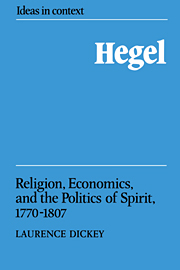Book contents
- Frontmatter
- Contents
- Preface
- Acknowledgments
- Introduction: Hegel in a Protestant cultural context
- Part I Hegel's Württemberg: “Civil Millenarianism” and the two faces of Protestant civil piety
- Part II Württemberg's Hegel: Applied theology and social analysis
- Part III Toward the Phenomenology: Sittlichkeit becomes a problem in social and political theory
- 5 Hegel discovers the economy
- 6 Sittlichkeit reconsidered: I. The essay on Natural Law
- 7 Sittlichkeit reconsidered: II. The essay on Ethical Life
- 8 Hegel's conception of the division of labor
- Epilogue: Bildung and politics: The “first class,” Christian pride, and “absolute spirit”
- Abbreviations
- Notes
- Index
5 - Hegel discovers the economy
Published online by Cambridge University Press: 11 January 2010
- Frontmatter
- Contents
- Preface
- Acknowledgments
- Introduction: Hegel in a Protestant cultural context
- Part I Hegel's Württemberg: “Civil Millenarianism” and the two faces of Protestant civil piety
- Part II Württemberg's Hegel: Applied theology and social analysis
- Part III Toward the Phenomenology: Sittlichkeit becomes a problem in social and political theory
- 5 Hegel discovers the economy
- 6 Sittlichkeit reconsidered: I. The essay on Natural Law
- 7 Sittlichkeit reconsidered: II. The essay on Ethical Life
- 8 Hegel's conception of the division of labor
- Epilogue: Bildung and politics: The “first class,” Christian pride, and “absolute spirit”
- Abbreviations
- Notes
- Index
Summary
While discussing the respective Christian and classical components of Savonarola's and Guicciardini's thought, Pocock has claimed that the two thinkers, despite some sharp differences, agreed on one thing: that “luxury” corrupted men. According to Pocock, while “Savonarola had seen luxuries and vanities as distracting the soul from the pursuit of salvation, Guicciardini [saw] them as distracting the citizen from the pursuit of the public good.” Given this parallel, Pocock concluded that “what should be stressed here is less the secular divergence between the Christian and civic traditions than the extent to which they found common ground in an ideal of austerity and self-denial [vis-à-vis luxury].”
That there was a good deal of this kind of asceticism in Pietism in general and in Hegel's thought in the early 1790s in particular has been a recurring theme in Parts I and II of this study. As has been shown, homo religiosus' concern with collective salvation and zōon politikon's concern with civic virtue were closely connected. Indeed, for many pietists the notion of “dying into life” by way of one's vocation made self-sacrifice in the name of the collectivity at once a religious and a political duty. So construed, “dying into life” could be regarded both as a means of political participation and as a step toward the fulfillment of one's religious “personality.”
Still, as was becoming increasingly evident in the eighteenth century, the call for ascetic self-denial vis-à-vis the passions and the impulse toward luxury that was so often associated with them was gradually being undermined by concrete historical developments and by the arguments of countless “apologists” for luxury, who were stressing its “utility” not only for economic development but also for the advance of “civilization” itself.
- Type
- Chapter
- Information
- HegelReligion, Economics, and the Politics of Spirit, 1770–1807, pp. 186 - 204Publisher: Cambridge University PressPrint publication year: 1987



